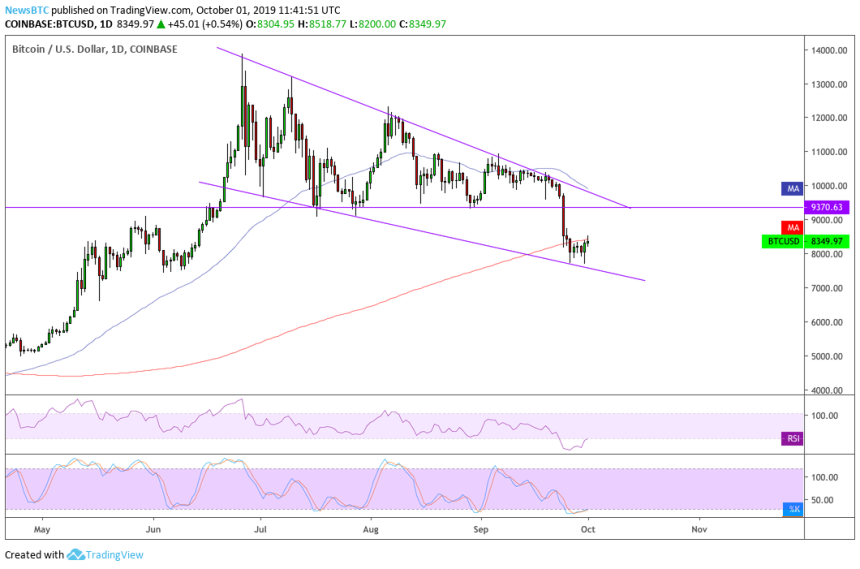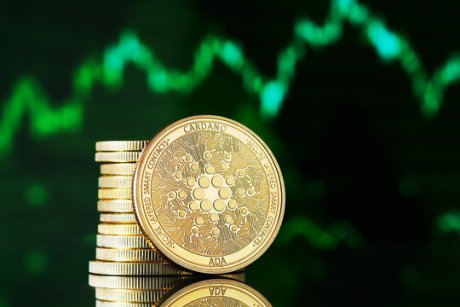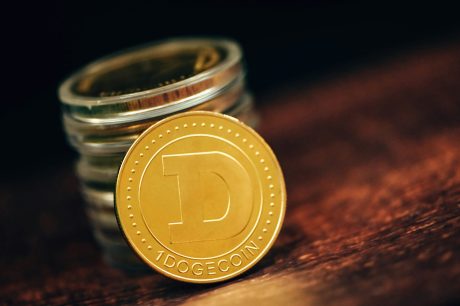Bitcoin eked out modest gains on Tuesday in tandem with similar moves on Wall Street.
The benchmark cryptocurrency surged by 0.5 percent to $8,349.97 as of 1141 UTC. The move upside brought its net week-to-date gains up by circa 8.5 percent, as measured from the session low of $7,701. The two-day winning streak also influenced other cryptocurrencies, with Ethereum recording about 7.2 percent and XRP about 6.9 percent gains around the same time.

Bitcoin Beats Gold (Intraday)
The profits came on the day when a broader stock market index inched up its year-to-date gains towards 19 percent – its best since 1997. US benchmark S&P 500 index, in particular, ticked higher to 2976.74 on Monday, driven by Apple, which closed at its peak level this year. Meanwhile, both bonds and commodities noted intraday downside corrections, with Gold slipping 0.27 percent and US 10-year yield up by 3.27 percent on the day.
The session-to-session price movements brought bitcoin in the category of risk-on assets like equities. That validated what Thomas Lee of Fundstat said last week. The Fundstrat co-founder noted that bitcoin would not rise unless the S&P 500 index establishes new highs.
The downturn in #bitcoin followed the risk-off selloff in #equities.
– reinforces our ‘unpopular’ opinion bitcoin does not do well in a ‘trendless macro’ environment.
– New highs needed in S&P 500 before $BTC can blast off.
Why? We think crypto is retail and thus, risk on https://t.co/y5Yo5NepPz
— Thomas (Tom) Lee (not drummer) FSInsight.com (@fundstrat) September 25, 2019
Gold bull and bitcoin skeptic Peter Schiff, too, stated that bitcoin is acting like equities. In a tweet published today, the Euro Pacific Capital CEO said in a critical tone:
“Bitcoin is a risk asset and not a safe haven/store of value. It has little in common with Gold and trades nothing like [it]. But if its neither a medium of exchange nor store of value, what is it?”
Uncertainty
Brent Schutte of Northwestern Mutual Wealth Management believes the stock market is uncertain due to fluctuating political factors in the US. The chief investment strategist told the Wall Street Journal:
“Never in my 25 years of doing this has so much seemingly revolved around what will happen from a political perspective each and every day. There’s always uncertainty.”
That is evident in the concurrent rise of both risk-on and safe-haven assets. JP Morgan’s research team said in a note that investors’ focus continues to stay glued on trade and the state of the world economy. Excerpts:
“The global economy continues to struggle in search of a bottom. The intensification of the trade war in August and tariff hikes in September are making it difficult to discern signal from noise, as well as transitory effects from more lasting developments.”
Bitcoin, on the other hand, is behaving like an ambidextrous asset. In Q2, it was a hedging instrument against the Sino-China trade war and yuan devaluation. Meanwhile, in Q3, it lost touch with its safe-haven status, reacting the least to both the geopolitical and macroeconomic risks. Lee stressed:
“Bitcoin may be ambidextrous: it works well in a risk-on world, but when you start to get nervous, then you treat it like digital gold. What we had in the summer […] was a market that looked like it was on a precipice, that looked like it could fall — but it never did. And I think getting stuck in that trend was bad for Bitcoin.”



















